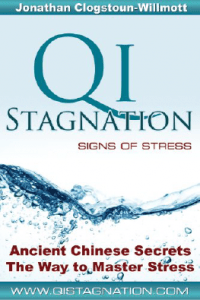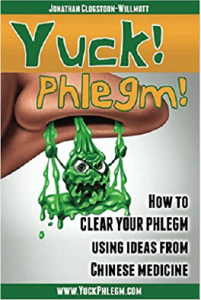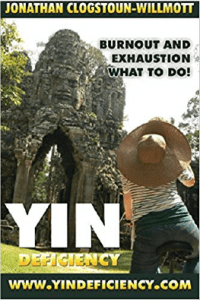Thanks for checking my selection of books
Hello! I’m Jonathan Clogstoun-Willmott; I started training in the 1970s in London and with patients from 1977. I continue training even today, over 40 years later. If there’s a course on something to do with Chinese medicine, I’ve probably done it or one like it!
Consequently I’ve collected qualifications. Here are some of them – BSc, BAc, DipAc, DipCHM, Cert ECBS, and a whole lot of others. I’m a member of the British Acupuncture Council and the Scottish Association of Homoeopaths, and was once a member of many more. Find out more here.


QI Stagnation
I had years of stress, working at something I didn’t enjoy (I was a Chartered Accountant!) so I know what happens to your body when you’re under pressure. Then I saw an acupuncturist who in one treatment pretty well cleared it and the physical illness it was causing me.
Eventually I studied and then practised alongside her. I spent 6 months in China where they also have plenty of stress. Back home, I saw how differently it affects us all.
I wrote a website for patients and suddenly the whole world was looking in. Guess which page they read the most? That made me realise that I’d covered just a small proportion of the ways stress affects people. So I wrote the book, partly to get my own ideas in order and partly to help others see Stress from another – and potentially very positive – point of view.
How might you benefit from the book?
If your problem is anxiety, after the introductory chapters, first read chapter 15.
If your sress comes from always working bent over a desk, chapter 13 is for you.
Angry, frustrated? Chapter 8.
Retired, without enough income? Chapter 11 may help.
From the descriptions you’ll recognise the kind of stress you get, and the book tells you how to interpret this and what to do.
As one reader commented, stress produces symptoms that are your energy getting tied up in knots.
When you get to the bottom of it, it’s a huge reservoir of untapped energy for you to enjoy. As it releases, it may transform our life!
What are people saying about QI Stagnation
Yuck! Phlegm!
The Chinese concept of ‘Phlegm’ is much more than just the stuff that embarrasses you! I wrote a page about it on this site, which was amazingly popular. Even more popular was a page on Phlegm after Eating.
Then patients complained I hadn’t covered all their particular kinds of phlegm.
I checked the internet to discover hundreds of solutions, but NO THEORY!
But there IS a theory and here it is.
For example, it explains the difference between different kinds of phlegm and why and when you get it: runny or white or yellow or thick or thin.
Once you grasp the basic idea behind it (and it’s really not hard) you decide for yourself what helps and what doesn’t.
So save yourself time! And find out what NOT to do!

Phlegm After Eating Flowchart Booklet
This is a 42-page flowchart booklet that complements Yuck! Phlegm and helps you assess your phlegm type and help you improve your situation based on the colour of your mucus.
When purchasing the booklet you also receive a flowchart to help you navigate the different types of phlegm at a glance.

What are people saying about Yuck! Phlegm!

Yang Deficiency
How does one regain joy and bounce, enthusiasm and the ability to inspire? It turns out that there are rules – who’d have thought it? Some are obvious, many aren’t, but Chinese philosophy made sense of it well over 3000 years ago. We can benefit from their insights.
Yang deficiency applies not just to you and me, but to movements, companies, countries, and enterprises of all kinds. Even in 2022 when we think we’re so modern, the Wheel of Life turns and huge established certainties take new forms, some disappearing as they’re tested, creating new structures.
It’s not comfortable is it!
Read Yang Deficiency and hang on to your hat!
Yin Deficiency
With Covid 19 still in prospect, we all need to check our levels of resilience – our yin reserves. Modern life, keeping up with appearances, our career, bringing up children, recreation and food choices often lead us to make mistakes.
One day we realise we’re not just worn out, anxious and restless: but exhausted.
For women it’s worse. At several vital times of life, their bodies go through huge changes, and these can drain them even without the other lifestyle factors.
Take Heart! From all the attention given to it in Chinese medicine, you aren’t the first person this has happened to, and by understanding how yin and yang work out in your life you can discover what to do and so recover your Self-possession!
(By the way! Many people think they’re yang deficient, but really, they should start with Yin Deficiency.)


Western Astrology and Chinese Medicine
Chinese medicine has its own astrology, just like Western Medicine! (What? You didn’t know?)
2022 is the year of the Tiger. Nearly every Chinese child knows what animal they’re born under.
Same here! Most of us know which Sun sign we are. But not many of us know which sign our Moon was in at birth, or what our Ascendant sign is.
Indeed, just these two additional factors can make a huge difference in understanding personality and health, let alone the positions and signs of the planets (the five planets known to the ancient astronomers being Mercury, Venus, Mars, Jupiter and Saturn and those more recently discovered, Uranus, Neptune and Pluto) in your chart.
Any one of these planets in a prominent position in your chart can radically alter the interpretation.
But nobody thought of combining the Western astrological birth-chart with the individual’s possible health from the point of view of Chinese medicine – until 1986, when this book came out. It used birth-charts of real people whose health was known.
For some years after publication it was recommended by several Western colleges to teach students the theory of Chinese medicine – not at all its intended audience!
It still sells, and I still get correspondence about it from students and readers worldwide.
However, it’s not an introduction to astrology which you’ll need to know something about to make best use of the book.
Also, the book is only available in paperback.
Here are some key articles to get you started:

What ‘Damp’ Does to You: Dampness in the Body
Understanding ‘Damp’ in Chinese Medicine helps you overcome many nasty symptoms and then improve your life overall.

Phlegm in Chinese Medicine an important tale teller
Phlegm causes many diseases in Chinese medicine. It is a surprising tale teller that needs more attention than most people think.

Understanding the Conception Vessel
A comprehensive guide to how the Conception Vessel manages your reserves and the power behind reproduction.
But there's much more to acupuncture than that!
How do Shiatsu, Acupressure, Reiki, EFT (emotional freedom technique), and AK (Applied kinesiology) get their ideas from acupuncture and its points?
Then, in addition, there’s Acupuncture in History! And of course, this site aims to explain Chinese medicine in English.
What should you never tell your acupuncturist to do? And how can you help your acupuncturist? It’s all here!
And what about the possible acupuncture side-effects and questions of safety?
After that, what about the effectiveness of acupuncture? – or could it all be just a placebo?
Something about what acupuncture is good for?
If you are a Do-It-Yourself fan then what about Do-it-Your Self-acupuncture? And in that case, are you taking sufficient notice of what food does for you? Read Clogstoun Congee.
I’ve watched acupuncture in action for 40 years and used it with thousands of my patients (see what they say here).
Even so, I’m still a student but, as you’ll read, my clients testify to its success for their health and in their lives.
